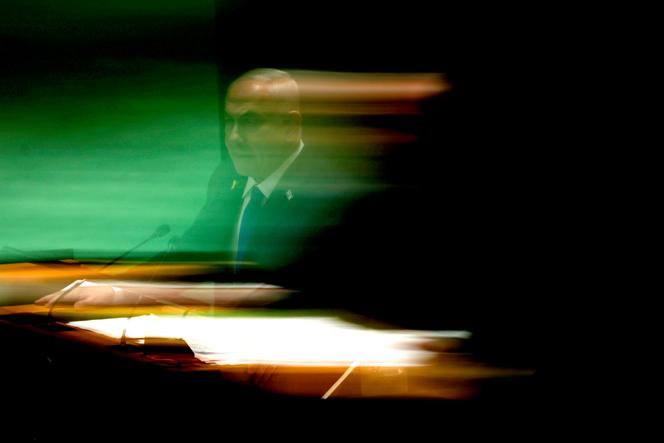


Benjamin Netanyahu paused in the middle of his speech to the United Nations General Assembly in New York on September 27. In just over an hour, an Israeli squadron would drop several dozen bombs on a six-building complex in Beirut, including powerful anti-bunker charges. By killing Hezbollah Secretary General Hassan Nasrallah, these pilots have turned a page in the history of the Middle East and opened a new Israeli war in Lebanon.
But for the moment, Netanyahu was keen to recall his first UN speech, in 1984. "I first spoke from this podium as Israel's ambassador to the UN in 1984," he said, stroking the light-colored wood. The prime minister took the risk of leaving his country, while his army had been methodically dismantling Hezbollah's leadership and response capabilities over the preceding 10 days, one strike after another.
One year after the October 7 tragedy, Netanyahu wanted to send a reminder to his fellow citizens, from his favorite podium and in his perfect English: Against all odds, he remains in office and his experience remains unrivaled, after a cumulative 17 years in office. "We are winning," he declared. This slogan has become his leitmotif, as Israeli forces cross the border into Lebanon, the air force pounds the "axis of resistance" in Gaza as well as in Yemen and Syria, and Iran awaits a major Israeli response to the salvo of 180 ballistic missiles it unleashed towards Israel on Tuesday, October 1.
Netanyahu considers this escalation to be "a historic turning point." Since September 29, he has put forward a new objective, as vague as it is presumptuous: "Changing the balance of power in the region for years to come." The next day, he informed the Iranian people that the Islamic Republic's hours were numbered. Why would anyone be surprised? Netanyahu has been close to American neoconservatives since the 1980s. For four decades now, Netanyahu has been promising to reshape the regional order. No one knows whether he believes his dream is within reach, but the Jewish New Year was starting, and he believed the time had come to draw the curtain on the October 7 debacle.
It was a year ago. Israel's defenses crumbled under the Hamas onslaught. The Netanyahu-led government was overwhelmed by militiamen armed with Kalashnikovs and RPGs – some 3,000, according to Israeli sources, while Hamas never provided any figures. Would his 40-year political career be overshadowed by this black day, the worst massacre in Israel's history? Shaken, Netanyahu isolated himself and seemed more indecisive than usual. "He doesn't seem like himself anymore," summed up right-wing journalist Hamit Segal. Within his Likud party, a muted rage has been growing against him.
You have 77.64% of this article left to read. The rest is for subscribers only.
